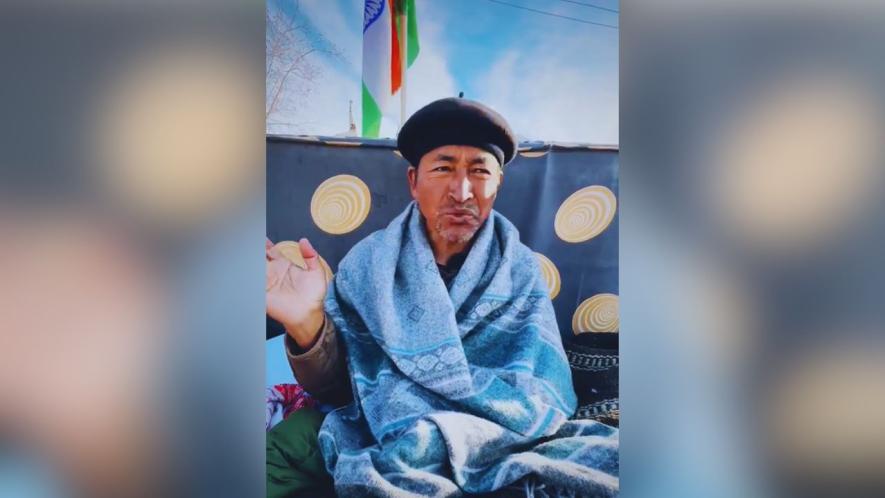Ladakh: Over 80 Civil Society Groups, Individuals Pledge Solidarity with Demand for Statehood

Image Courtesy: Twitter/@Wangchuk66
Over 80 civil society organisations have issued a joint statement in solidarity with the ongoing protest and hunger strike in Ladakh to demand full statehood and constitutional safeguards to protect the “land, culture, environment and the economic interests” of the region.
The statement issued by the Vikalp Sangam (Alternatives India) said: “We express solidarity with all those fasting in the frigid conditions of Ladakh, including Sonam Wangchuk and many others; we have expressed our solidarity through actions across India over the last few days.”
Wangchuk, a Magsaysay award winning climate and peace activist, along with others has been on fast since March 6, after talks with the Union Home Ministry on March 4 failed to make any headway.
Signatories to the statement include, Ladakh Arts & Media Organisation, The Himalaya Collective, Snow Leopard Conservancy India Trust, Rythu Swarajya Vedika, Mazdoor Kisan Shakti Sangathan, National Federation of Dalit Women, Forest Rights Coalition JK, Centre for Pastoralism among others.
“We express shock about the way in which these demands that people/citizens of Ladakh have been making for many years, is systematically sidelined, with the central government dragging its feet and then finally rejecting them outright. This is despite the party in power having made a promise to grant 6th Schedule status to Ladakh when it was converted into a Union Territory in 2019,” read the statement.
There have been massive protests in Ladakh, including a complete shutdown in Leh, including during Prime Minister Narendra Modi’s recent visit to Jammu & Kashmir for the first time after abrogation of Article 370 in 2019 and the bifurcation of the state into two Union territories.
Before announcing his fast in front of huge crowd, Wangchuk had said: “I am Sonam Wangchuk reaching out to the people of the world from Indian Himalayas, a place called Leh, Ladakh, at 3,500 metres, 11,500 feet,” Wangchuk told the massive gathering in Leh, adding “Today on the sixth of March, I will be sitting on a fast unto death, which will happen in stages of 21 days each, extended as necessary. It is 21 days because this happens to be the longest fast that Mahatma Gandhi kept during the Independence movement of India. I want to follow the same peaceful path that Mahatma Gandhi followed, where we inflict pain on ourselves, not on anybody else.”
The Kargil Democratic Alliance and the Leh Apex Body, which were formed after 2019, have also called for solidarity with the protesters and have held strikes and shutdowns.
As support for the protesting people garners wider support, the joint statement condemned the “attempted silencing of voices or intimidation and repression tactics trying to block students and youth from attending the ongoing mass fast or other peaceful means of protest, and the placing of CCTV surveillance of the fasting site to keep track of people visiting and participating in the fast. “
Urging the Union government to agree to the demands of the people of Ladakh, the statement said “The people of Ladakh have put their lives in danger during all the wars in the region and stood like a bulwark against unfriendly neighbours. Thus, the interests and aspirations of the people of the region, and the environment they depend on, need to be honoured and fulfilled.”
Reminding the Bharatiya Janata Party (BJP) government at the Centre of its promise for adequate constitutional safeguards, the statement said there is “genuine fear that UT status without constitutional safeguards in Ladakh’s governance, could result in the kind of extractive modern unsustainable development that has impacted the rest of India. Unregulated growth in tourism, influx of businesses and large corporate houses, mining interests, could destroy the fine balance that the people of Ladakhi have achieved while pursuing their livelihoods as well as exacerbate the glacial loss that is already a huge concern, threatening to impact livelihoods of not just the people of Ladakh but of millions of Indians who depend on its waters. Corporate giants have already begun exploring the area for business opportunities (including in tourism) and prospecting for minerals and other natural resources. “
Get the latest reports & analysis with people's perspective on Protests, movements & deep analytical videos, discussions of the current affairs in your Telegram app. Subscribe to NewsClick's Telegram channel & get Real-Time updates on stories, as they get published on our website.
























